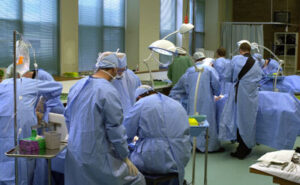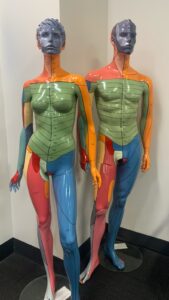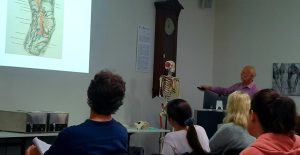There are currently no scheduled events for this course. To find out first when the next dates are added, sign up to our mailing list.
If it’s been a while since you had the privilege of returning to the anatomy laboratory to learn, then you’ll love this event!
Pelvic pain and organ dysfunction is a common presentation - with 1 in 5 women and 1 in 12 men suffering at some time in their life. This sensitive area of practice requires a sound understanding of functional pelvic anatomy, embryology and how this translates to common symptomatology, and individualised treatment.

This clinical anatomy course - hosted at the University of Melbourne Cadaver Wet Lab - utilises real cases seen by the interdisciplinary team at the Women’s Health & Research Institute of Australia in Sydney to review the clinical anatomy of pre-dissected pelvic cadavers under the guidance of gynaecological surgeon and pain medicine physician Prof Thierry Vancaillie and advanced pain management osteopath Liz Howard.
These cases will highlight the importance of understanding the complex interrelationship of the pelvic anatomy structures and how this helps us understand patient symptoms.
The day will conclude with a tour of Melbourne Uni’s private Harry Brookes Allen Museum of Anatomy and Pathology - one of Australia's largest collections of human tissue specimens, comparative anatomy specimens and historical anatomical models.
At the end of this workshop you will be able to;

This course is applicable to all medical practitioners and allied health with an interest in pelvic anatomy. It would serve as an excellent addition to Pain & Pregnancy, The Pelvic Pain Puzzle and The Endo Enigma courses.
The course will also feature exclusive access to pelvic anatomy, embryology, physiology pre-learning videos (to maximise time in the lab).
The course will run from 8:45AM to 4:30PM. Places are limited to 24 attendees. It includes morning and afternoon tea and an e-certificate of attendance for your CPD records. The course can be counted as 8 hours CPD.

Professor Thierry Vancaillie is one of Australia’s few accredited Gynaecologist and Pain Medicine Physicians, renowned for his role in developing minimally invasive procedures, including hysteroscopic and laparoscopic surgery. His expertise includes pudendal neuralgia, pelvic pain, post-surgical pain due to mesh implants and the surgical treatment of infertility due to Asherman's Syndrome.
Liz Howard has 25 years experience as an osteopath. She holds the title of Advanced Pain Management Osteopath with a Master of Science in Medicine (Pain Mgt) (USYD), she conducts clinical research and is a clinical specialist in sacral neuromodulation. She has more than 17 years’ experience teaching at multiple Australian universities and as a CPD provider. Liz has been working in collaboration with Prof Vancaillie the team at WHRIA for over 10 years, providing osteopathic manual therapy, pain education, exercise and home care advice to help guide patients on their path to recovery, as a part of a whole team approach.
The Women’s Health & Research Institute of Australia (WHRIA) is a tertiary specialist clinic for pelvic and perineal pain, general gynaecology and hormone issues, with referrals for women and men from all over Australia.
Presentation from Prof. Thierry Vancaillie (Gynaecologist) and Liz Howard (Osteopath) about their experience treating patients with vaginal mesh at WHRIA
Pelvic Pain Australia Conference - 2018
Watch the pre-learning embryology and anatomy video from Prof. Vancaillie.
Prof is personable, approachable and shares his knowledge with ease. The course content is set at the right level (not too difficult/easy). Liz is a legend - fun, sincere, knowledgeable and keeps bringing examples back to osteo.
Ashar Salia
Hands-on inspection of the dissected anatomy was a great opportunity for a deeper understanding. The expertise of the presenters was very evident and they were excellent at sharing their knowledge.
Robert Gorman, PhD
Was great to review the anatomy of the pelvis then look at the wet specimens in the lab to visualise the diversity between specimens. The Melb Uni anatomy museum was amazing to have access to. Loved Thierry's individual approach to his patients and how holistic his thinking is encompassing a multi-disciplinary approach. Was great to discuss specific case studies to see the variety of presentations and different treatment approaches.
Natasha Rizzi